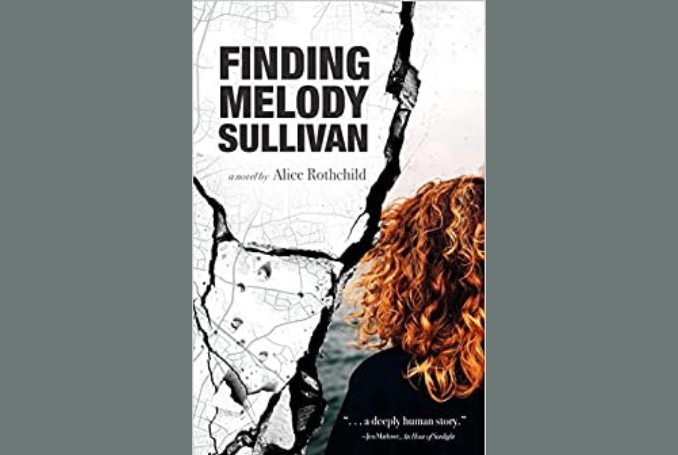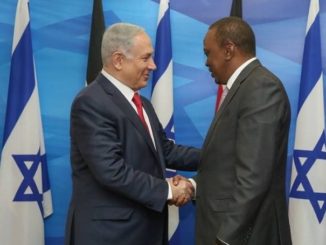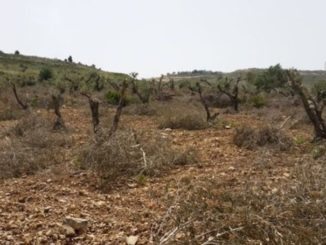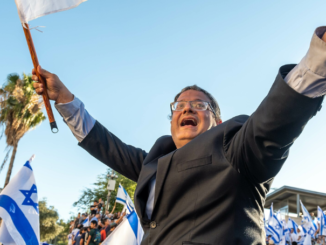
By Benay Blend
(Finding Melody Sullivan. Alice Rothchild. Cune Press, Seattle, 2023)
Alice Rothchild’s long career as a board-certified obstetrician-gynecologist and human rights activist enabled her to write this book. In medical school she began exploring the connections between medicine, social justice, and politics. During the Vietnam war she became interested in US foreign policy In 1997, she shifted her focus to the social justice movement as it relates to Israel/Palestine.
Her books include ‘Broken Promises, Broken Dreams: Stories of Jewish and Palestinian Trauma and Resilience,’ ‘On the Brink: Israel and Palestine on the Eve of the 2014 Gaza Invasion,’ and ‘Condition Critical: Life and Death in Israel/Palestine.’ She also directed a documentary film, ‘Voices Across the Divide’.
Rothchild’s Finding Melody Sullivan (2023) is no ordinary coming of age novel. It tells the story of a young Jewish girl and her Palestinian best friend, Yasmina. Both live within the safety of Vermont. In the opening scene they are joined by a third character, Aaron, who is a devout Jewish boy with a deep attachment to Israel.
At first, Yasmina tries to bridge the gap between herself and Aaron. She tells him that “Jews and Muslims really have much in common. Like us” (9). As an example, she mentions their dietary rules. As the child of a Jewish mother (now deceased) and a Catholic father, Melody has no feelings at all about religion.
Initially, Melody claims that she is neutral, but the first cracks appear when she announces that she is travelling to Jerusalem with her father who is attending an archeological conference. Each child claims Jerusalem as their own—Melody for Catholics, Yasmina for Muslims, and Aaron for Jews.
To make matters worse, Aaron claims that Jerusalem is the capital of Israel, and what’s more, Palestine as a state does not exist. Yasmina replies that she has family in Hebron, so for that reason it most certainly exists. Melody still claims her neutral space; but suggests maybe she could visit Palestine with Yasmina so that the two could be together.
For the first time, there are complications. Yasmina is going home to see her sick grandmother and her uncle who was shot in the leg by Israeli soldiers. When Yasmina replies that “it’s complicated” (p. 24), her friend, who has no knowledge of checkpoints, doesn’t understand. Though she knows that Hebron and Jerusalem are not all that far apart, that the roads between them are marred by obstacles for Palestinians is not such common knowledge.
Melody’s awakening—to the realties of the Occupation and to her own hidden strength—begins when she arrives in Israel where she sees first-hand what Yasmina’s life is like. At her cousin’s brother’s house, she meets one of his military friends who follows her to the bathroom, then assaults her. Because his role in the military requires that he see Palestinians as less-than, he apparently sees women, too, as easy prey. Earlier, her father had justified her cousin’s role in army intelligence; “Top-notch security, Melody. Israelis keep everyone safe. It’s just how it is” (p. 61).
Melody does not yet connect the violence of her assault and the abuse that Palestinians face each day. Instead, she blames herself. Was it something she was wearing? The t shirt? But she is making inroads in recognizing that what was beautiful on the surface (the beach, the sun) was more sinister underneath (her assault, her fear).
When she finds that there is no one she can talk to, Melody sets off to see her friend, not understanding yet the dangers she might face. Her initial naivety cracks open when she sees a group of Israeli soldiers “casually holding assault rifles, chattering, smiling” (p. 86) while leaning against a wall. Though everyone else acts like this is normal, Melody has her doubts. “How could this be normal? Am I crazy?” (p. 186), she asks.
Yasmina’s uncle Mahmoud Khulood meets her at the station (“Arab bus station???” [p. 87]). Melody continues to question her view of what is real. The wall, for example, looks more like a prison, in her view. “So is this normal? (p. 93), she asks again. Mahmoud tells her that they are always at the mercy of the soldiers who have unlimited power over the Palestinian population.
When Melody sees the surveillance cameras everywhere, she concludes that it is a prison, and in doing so, she comes one step closer to understanding the nature of life under Occupation. “Every Palestinian has a story of exile” (p. 108), Mahmoud tells her. “The Israelis control so much” (p. 108), but they continue to live their lives. In this way, Mahmoud makes clear that the Occupation enters every facet of life, but, like many Palestinians, he refuses the role of victim, choosing instead to experience the hope and joy that are part of cultural and political resistance.
“This whole place is a war zone” (p. 106), Melody concludes. Mahmoud agrees that “there is no justice for Palestinians,” but there is also “stubbornness and the resolve to survive” (p. 114). As if to prove his point, they come upon a wedding party making its way up Tel Rumeida and Shuhada Street, an area infamous for settler abuse. “You see,” Mahmoud explains, “life goes on. We still fall in love” (p. 129).
Throughout her journey with Mahmoud, Melody begins to see that the trip between Jerusalem and Hebron is complicated in many ways. In a country where people do not see what is before their eyes, Melody’s role as witness is important. Her camera acts as a “shield and sword” (p. 130) for she can be an observer behind its lens, both there and not there simultaneously. As a tool to educate non-Palestinians about the Occupation, her photos are a powerful means of showing others what she herself has seen.
Eventually, Melody arrives at Yasmina’s house where she meets the entire family. At this point, she has reached a whole new level of awareness, including the knowledge that her trauma, the death of her mother, the emotional absence of her father, are not comparable to Yasmina’s daily life. The Yasmina that she knew at home is not the same as her friend in Palestine. As Yasmina says, she lives in “two different, clashing worlds” (143), one is a refuge where she can hide from the dangers that reside in Hebron.
When Melody tells her that she, too, has experienced grief, Yasmina explains that it is not the same. It is not a “contest” (p. 145) either. “You’re in a bubble, Mel. A very privileged bubble” (p. 145). Her “hurt is different” (p. 145) than the trauma of her friend; not worse, not better, but different. In this way, the author goes beyond the notion that dialogue heals all problems. Melody and Yasmina do not share equal power in the relationship, but the former has begun to listen with an open mind, and that is a step towards understanding.
When Aaron joins the conversation via text, he has trouble hearing what Melody has to say. Aaron will have to turn his back on family as well as community before he can accept her words. In this case, he has the most to lose. “If you don’t make the world a better place for everyone, then what is the struggle for righteousness about?” (p. 145), asks Melody, but Aaron has no answer.
Never again means never again for everyone, a mantra that for Aaron brings the issue home. In her book Alice Rothchild has presented the Occupation in a way that young adults can understand. Her characters are relatable to readers because they share many problems common to the young. Melody’s journey includes issues such as Israel/Palestine, but also identity, sexual awakening, friendship, and her relationship with her father who, along with Melody, is still grieving his wife’s death. The narrative is also suitable for older readers who want to learn about the Occupation.
In the end, Melody explains that “life goes on here [in Palestine]. There’s a ton of joy and love” (p. 160). Herein lies one of the many takeaways from the book. Palestinians are presented as human beings, not terrorists, who are more than just victims of the Occupation. By living their lives the best they can under a brutal system, they are modeling a powerful form of resistance. It’s a lesson learned by Melody, who has also learned to deal more effectively with her grief.

– Benay Blend earned her doctorate in American Studies from the University of New Mexico. Her scholarly works include Douglas Vakoch and Sam Mickey, Eds. (2017), “’Neither Homeland Nor Exile are Words’: ‘Situated Knowledge’ in the Works of Palestinian and Native American Writers”. She contributed this article to The Palestine Chronicle.







